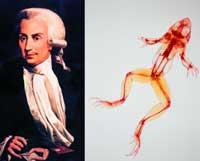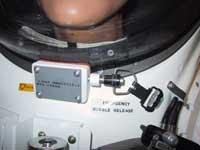Science, chance and... eureka!

As many discoveries have been caused by an unexpected, such as penicillin, velcro or smallpox vaccine. When the apple Newtoni fell on the head the law of gravity was born, and thanks to the paws of frogs, Luigi Galvani laid the foundations of neurophysiology XVIII. At the end of the 20th century. Seeing the frog legs hanging from the metallic threads coming into contact with the metal railing contract, Galvani realizes the relationship between muscle movement and electrical stimuli.
Without going any further, the 2000 Nobel Prize in Chemistry mistakenly found plastic drivers. In the laboratory of Japanese researcher Hideko Sirakawa used a catalyst a thousand times more concentrated than expected to synthesize a polymer, obtaining a plastic capable of transporting electricity. It was something completely new in the world of plastics, and today it is a top-notch research topic. Conductive polymers have interesting applications as antistatic material. They are also suitable for bulbs, TV screens and luminous circulation signals, as they save more energy and provide less heat than conventional materials. In addition, they are closely related to molecular electronics and can be the basis of faster and smaller computers. Curious, but some believe the XXI. The technological revolution of the 20th century is due to a measurement error.
Something more than pure chance

The researcher Louis Pasteur pointed out that ‘in the field of observation only helps the chief who has prepared chance’, and he does not lack reason, because the unexpected event is useless without the ability to draw conclusions from that. For example, Alexander Fleming, the father of penicillin. The discovery was made in 1928, when staph bacteria left the box that was growing open and unintentionally infected with mold
That day he took a two-week break and, just around the holiday, saw that he was covered in a lustful box. But he didn't throw it away and gave up the experiment; he discovered that around the mold there were no bacteria and concluded that mold prevented the growth of bacteria. Mold was a fungus Penicillium notatum researching in the laboratory of the ground floor. Irritation in the laboratory was beneficial for Fleming and for all of us in the 20th century. Penicillin was one of the great revolutions of 20th century medicine.

It is clear that chance helped Fleming a lot to find penicillin, but can you say that he found it by chance? Fleming had been searching for substances that had died but did not cause damage to human tissues and had all the senses attentive. Among scientists the term serendipity is used to describe these happenings.
It is an English word, which still has no translation in Basque and XVIII. Born in the twentieth century. It was first used by the English writer Horace Walpole in the letter written in 1754 to his friend and friend Horace Mann. In it he spoke of the legend of the kingdom of Serendip, located in present-day Sri Lanka, and of the three princes of the city. These princes were special because in their travels they found answers to problems and unthought questions. And the ability to make all these discoveries is due to their ability to observe and to clarity. Horace Wallace described with the term serendipity the surprising capacity of the princes of Serendip and, in the twentieth century. In the mid-twentieth century, Walter B. American biologist Cannon used the same word to indicate the good use of chance in scientific research.
Vindication of basic research
As for the word serendipity, the discoveries due to the happy combination of chance and ingenuity are collected. In fact, it must be recognized that in the development of science researchers have also had some merit, right?

Apart from Joke, these random issues are of great interest to researchers in defense of basic science. They complain that they have to announce what they are going to do to subsidize investigations; they are angry that investigations that do not follow a concrete and useful objective are discarded. Economic interests denounce that some issues have become stars, such as genome, biotechnology or certain fields of medicine, while basic research, which is done only by knowledge, is not taken care of at all.
Just announce any discovery, what is it for? the question is asked. But this question does not always have an answer. What's more, you don't have to have an answer. What is a newborn baby for? Benjamin Franklin told a man he was seeing the first man-led balloon take off like him. They were in Paris in November 1783, and the same invention that Franklin had fascinated seemed a little useless to him. Franklin made important contributions in the field of electricity, perhaps because he looked at the news differently.
Published in 7K.
Buletina
Bidali zure helbide elektronikoa eta jaso asteroko buletina zure sarrera-ontzian











